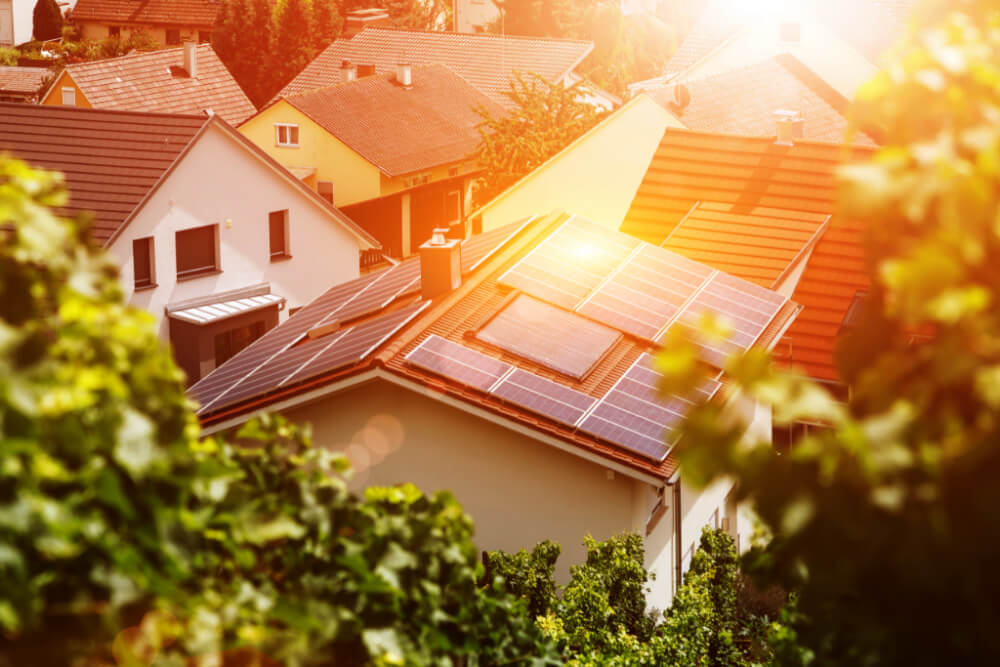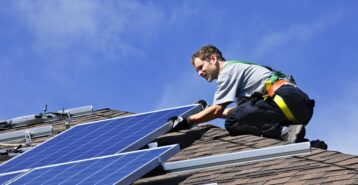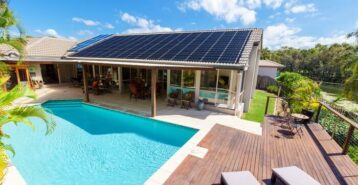Are you doing a solar project?
Modernize can pair you with three to four pros in your area, so you can compare options and save time and money.
Many homeowners have questions about how they will finance solar panels. Good news: in the last decade, the cost of solar has dropped 70 percent. There are also a plethora of rebates, incentives, and tax credits to support homeowners who want to go solar.
Here’s what to consider to ensure solar panels are right for your home, how to estimate what the total cost will be, and options for financing.
Questions To Ask Before Financing a Solar Project
Before planning solar panel financing and installation, make sure to ask the right questions about your home’s compatibility with solar power:
Is My Roof Suited For Solar Panels?
Roofs need to be in good shape before installing solar panels. They need to be able to support the solar panels as well as solar panel mounts. If you are due for a roof replacement or repair, it’s best to hold off on solar panels until this is taken care of. You’ll also need to evaluate the pitch of your roof, the direction it’s facing, and whether there are any obstructions (like chimneys) that may get in the way of the panels or sunlight.
What Code Issues Might I Run Into?
Most cities require permits for solar panel installations. However, there might be other installation requirements, too. The fire department may require them to be installed a certain way, or there may be structural requirements. An experienced contractor should be aware of these code and permit requirements.
Can I Afford Solar?
Though the cost of solar is dropping every year, putting yourself in a financial bind can eliminate the savings benefits of solar. Energy Sage has a helpful calculator to get an idea of what the cost would be in your area.
There are additional cost considerations beyond the cost of the solar installation. It’s worth exploring the soft costs as well as your estimated return on investment (ROI). Although you would be investing in solar panels now upfront, you may earn you even more money than you paid in utility savings and if should you ever sell your home. You should also see what your options are for selling excess solar energy, a process known as net metering.
Also, if you don’t want to purchase the solar panels outright, there are leasing options for homeowners.
Is Going Solar Worth It?
Whether financing solar panels is worth it or not largely depends on the potential savings you will see over time. Homeowners who live in areas with higher energy and utility bills are going to benefit the most.
Before coming up with a plan to finance your solar panel project, take a look at what you are spending on electricity each month. Then, compare it to the estimated savings you can expect by switching to solar.
Homeowner Options for Financing Solar Panels
Thankfully, homeowners have many options to pay for solar panels. Consider the following solar panel financing options. Keep in mind that a combination of the following may be the answer, too!
Credit Cards
It may seem obvious, but the simplest solar panel financing answer is to put it on your credit card. This may be beneficial if you have a credit card that has a significant credit line and offers rewards and cash back. However, like other major purchases, be sure this is a cost you can pay back in a timely manner to avoid interest building up.
Loans
Homeowners with a good credit score and financial history can benefit from taking out a private loan. By installing a solar panel system, you will increase the value of your home. If the cost is right, it will make the loan worth it. It’s a matter of balancing the numbers to ensure that it makes sense. For instance, if you plan to resell your home soon, the loan may pay for itself in a timely manner through ROI alone.
Find the Right Contractor for Your Solar Project
Whether you’re ready to begin your project now or need some expert advice, our network of contractors are here to help. With a few simple questions, we’ll find the best local professionals for you
Government Incentives
In an effort to encourage homeowners to install solar panels, the federal government offers credits, rebates, and other incentives. This includes the Residential Renewable Energy Tax Credit. This applies to up to 26 percent of your installation (this will decrease to 22 percent in 2023).
Different states and even municipalities are offering tax credits and performance-based incentives for homeowners. For example, in California, the city of Rancho Mirage will provide a $500 rebate for the permit fee. Los Angeles and San Diego participate in net metering. Look out for rebates and incentives like these in your area in order to make financing your solar panels worth it.
Federal Housing Loans
If a loan is a better option for you financially, the Department of Housing and Urban Development (HUD) offers private loans for home improvement projects. They insure them up to $25,000.
Going through a government agency will provide lower interest rates than you would get through a bank. If the loan is greater than $7,500, it “must be secured by a mortgage or deed of trust on the property.” This means you’ll be borrowing against the value of your existing equity.
A caveat: The home must be older than three months old and occupied for longer than three months.
Which is the Best Solar Panel Financing Option?
The best solar panel financing option varies from homeowner to homeowner. Factors to consider when deciding on a solar financing option that works for you include:
- Your credit score
- Your financial situation
- Rebates and credits offered in your state
- Whether you qualify for different loans
- The interest rate(s) of available loans
A trusted financial adviser or solar professional can be helpful in guiding you on what financial decision to make when it comes time to pay for your solar panels.
Lease or Buy?
If you want to go solar but aren’t ready to make the full commitment, there’s the option of leasing solar panels. When leasing, the homeowner does not own the solar panels and is not typically responsible for the upkeep, maintenance, or even installation.
Usually, under a solar lease agreement, the homeowner pays a third party to purchase the energy generated at a lower cost. The incentives and rebates that we discussed earlier would not be applicable with leasing, but the ability to take advantage of solar energy at a much lower cost is worth it to many homeowners.
Power Purchase Agreements (PPA)
Homeowners can also look into a power purchase agreement (PPA). Unlike a solar panel lease, PPA’s give homeowners the option to purchase the solar panels after the agreement is up. A PPA usually lasts 20-25 years, but they typically include a clause that allows homeowners to purchase the solar panels at any time. Similar to a “lease to own” agreement, this is a viable option for those who are not sure about financing the solar panel system right now, but may want the option down the road.
Like solar panel lease agreements, a PPA allows a third party to install solar panels. Installation costs and maintenance are the responsibility of the third party.
How to Find the Best Solar Panel Installation Price
You won’t know the real cost until you start talking to contractors. Gather quotes from three contractors. A quote that is significantly higher or lower than the rest should be cause for alarm. The contractor you choose should be experienced, reliable, knowledgeable, and someone that you feel comfortable working with.
Find the Right Contractor for Your Solar Project
Whether you’re ready to begin your project now or need some expert advice, our network of contractors are here to help. With a few simple questions, we’ll find the best local professionals for you
Reviews from Real Homeowners
Welcome to Homeowner Resources! We are the Modernize blog. Modernize pairs more than 3 million homeowners a year with pre-vetted contractors in their area. This blog started because we believe homeowners should know everything about their homes, from how their HVAC works to which front door colors they might love. On Homeowner Resources, you can find information on every part of your home, right down to how you can negotiate with contractors to get the best price. Here's more about the blog.
Need a contractor? Learn more about how Modernize finds the right pro for you.




